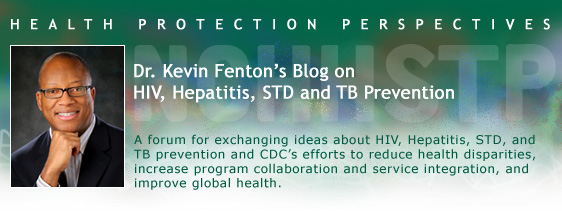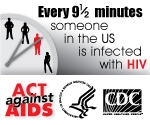
Reflecting on the Social Determinants of Health
December 18
2008
9:00am ET
by Kevin
Last week, NCHHSTP hosted a unique gathering that looked at how CDC and its partners could address the social factors that can lead to infectious diseases and health disparities—we refer to these as the social determinants of health. In preparation for the meeting, I found myself reflecting on the complexity of society and the domino effects that can result when basic foundations of education, health care, and financial security are fragile or absent.
This two-day meeting convened more than 100 participants from a diverse range of academic, scientific, public health, and community backgrounds. We each brought our own views on this subject and the role of social determinants in the prevention of HIV/AIDS, viral hepatitis, STD and TB.
Discussions focused on efforts to accelerate the reduction of health disparities and promotion of health equity for our infectious diseases. The group identified poverty, poor educational attainment, poor access to health care, high incarceration rates, and persistent stigma and discrimination and the complex relationships among these factors as key determinants. Discussions also identified and prioritized justifiable suggestions that address social determinants of health in the areas of health policy, surveillance and epidemiology, prevention research and evaluation, and agency partnerships and capacity building. Mention was made as well of the current economic downturn and a renewed focus on prevention.
The suggestions from this meeting will inform every part of our Center's funding, relationships, and work. They will provide a framework and road map for strengthening our efforts in this arena. In the coming months, we will publish proceedings from this meeting and a White Paper on the Social Determinants of Health. We are committed to clarifying the "final mile"—our vision for what we want to achieve—as well as clear and actionable strategies for moving forward. We are also committed to ensuring proactive engagement of our partners and the public along the way.
In closing, many participants agreed that the focus on social determinants of health for reducing health disparities and promoting health equity was appropriate and timely. I’m excited about this enhanced focus for our National Center and look forward to hearing what you are doing in your own jurisdictions, and working with you, as we build on these discussions and begin development of actionable steps.
![]() Submit a comment - Comment Policy
Submit a comment - Comment Policy
![]() Dr. Fenton,
Dr. Fenton,
Thank you,
Jeri Teller-Kanzler, CISM
President & Principal Consultant
Risk-MAPP, LLC
Posted by Jeri Teller-Kanzler on Wednesday, January 7, 2009 at 8:55 pm ET
![]() Ms.Teller-Kanzler,
Ms.Teller-Kanzler,
TB bacteria is spread through the air from one person to another when someone who is sick with TB disease of the lungs or throat coughs, speaks, laughs, sings, or sneezes. In most people who breathe in TB bacteria and become infected, the body is able to fight the bacteria to stop them from growing. The bacteria become inactive, but they remain alive in the body and can become active later. This is referred to as latent TB infection. A person can have latent TB infection for years. But if that person's immune system gets weak, the infection can quickly turn into active TB disease. Also, if a person who has a weak immune system spends time with someone with active TB disease, he or she may become infected with TB bacteria and quickly develop active TB disease.
Because HIV infection weakens the immune system, people with latent TB infection and HIV infection are at very high risk of developing active TB disease. All persons with HIV infection should be tested to find out if they have latent TB infection. If they have latent TB infection, they need treatment as soon as possible to prevent them from developing active TB disease. If they have active TB disease, they must take medicine to treat the disease. CDC has a booklet, Take Steps to Control TB When You Have HIV, about the importance of TB testing, treating TB infection, and treating TB disease when a person has HIV infection.
As far as risk factors for HIV and TB co-infection, I will have to give you a two - fold answer. First, there are specific risk factors for acquiring HIV. We have outlined these risks on the basic information section of our HIV Web site.
Next, to get infected with TB bacteria, an individual would have to come in contact with someone with active TB disease. People with TB disease are most likely to infect people they spend time with every day, such as family members or coworkers. Individuals who have come in contact with someone with active TB disease should contact their doctor or their local health department to get tested. CDC provides contact information for the TB Control Offices in each state on our TB Web site.
Hope this answers your question.
Kevin
Posted by Dr. Kevin Fenton on Monday, January 12, 2009 at 10:32 am ET
Contact Us:
- Centers for Disease Control and Prevention
1600 Clifton Rd
Atlanta, GA 30333 - 800-CDC-INFO
(800-232-4636)
TTY: (888) 232-6348
24 Hours/Every Day - cdcinfo@cdc.gov



